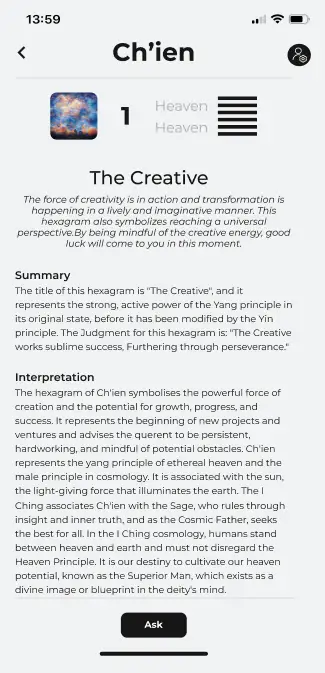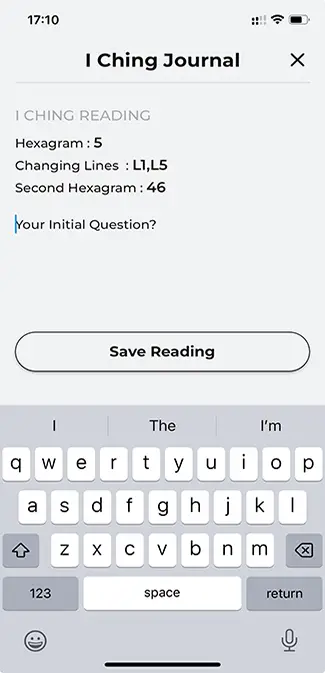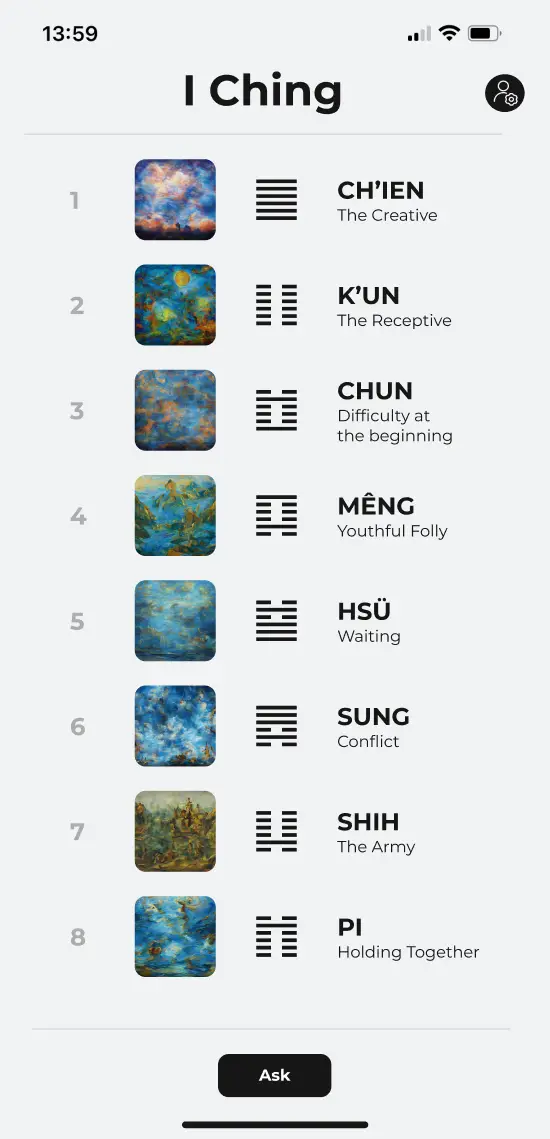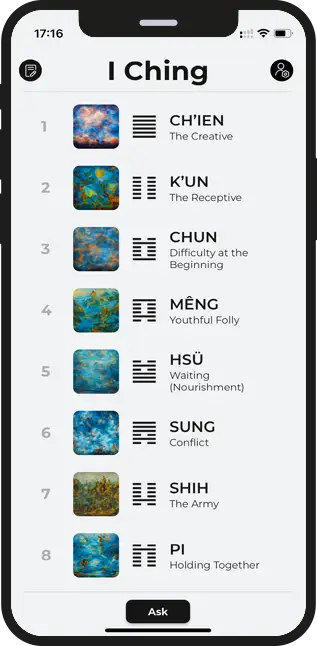
Heaven
Wind
Hexagram 44 - Coming to Meet - KOU
Beware of the seductive allure of power, as it can lead you down a dark path. It is essential to exercise caution and reserve in all your dealings, as unexpected challenges may arise. Resist the temptation to give in to your desires and stay true to your principles.
Summary
The hexagram represents a meeting or coming together of two forces, whether two people, two ideas, or two energies. The key takeaway from the judgment is that this meeting should be done with mutual respect and with the understanding that one force should not dominate the other. The image for the hexagram is that of a thunderstorm approaching, which can be seen as a metaphor for the two forces coming together with the potential for significant impact.
Interpretation
This is a hexagram of balance and harmony, reminding us of the importance of mutual respect and understanding in relationships and partnerships. At its core, this hexagram calls us to meet others halfway with an open mind, patience, and tolerance.
However, the hexagram also cautions us that we should only come halfway and stay within the limits of dignity and correct behaviour. When we encounter situations or ideas that require us to compromise our inner dignity or sacrifice our higher nature, we must step back and reevaluate the situation.
The hexagram suggests that sometimes we can become too open-minded or tolerant to the point where we allow evil ideas and situations into our lives by dismissing our intuition. In such cases, we will meet the problem or idea halfway, even if it is detrimental to our well-being. The key is to ask ourselves whether becoming involved will take us beyond the limits of correct behaviour and to refrain from entertaining any idea or becoming engaged in any situation that contains the element of seduction.
The hexagram describes the seductive and flattering thing as a "bold girl who lightly surrenders herself and thus seizes power." Whether it is a flattering or comforting person, situation, or idea, the fact that it comes boldly and easily should be a warning to us to stand by our inner guidelines of what is correct and essential.
Observing evil in others invariably arouses our ego, which wants to pay back insult with insult and blow with blow. Once we allow our ego to be brusque and intolerant, it develops a demonic power. To undermine its authority, we need to return to humility and remember how we have been helped to overcome some of our weaknesses. We may need to recall the power our fears and misconceptions have had over us and our difficulty in becoming free of them, for these are the same fears and misconceptions that give rise to the evil we observe in others.
To control our egos and inferiors, we mustn't feed them by listening to their whining complaints. We empower evil thoughts when we give them serious consideration. To cease listening to them once they have begun requires persistence and firmness. It is easier to curb them initially; the more we entertain them, the more completely they persuade us to their viewpoint.
Some experts interpret Hexagram 44 as a symbol of the union of yin and yang, the balance of forces that creates harmony in the universe. Others see it as a symbol of the union of the individual self with the collective or the union of the human with the divine. Whatever interpretation one chooses, the critical message of Hexagram 44 remains the same: in relationships and partnerships, it is essential to meet others halfway with an open mind, patience, and tolerance while maintaining our inner dignity and upholding correct behaviour.
Sage Advice
Cultivate self-awareness and self-discipline. The hexagram advises that to lead a fulfilling and meaningful life, it is essential to tame the ego and check negative emotions as they arise. The ego can be a powerful force that causes us to act impulsively and with a narrow focus on our desires and interests. By maintaining a strong sense of inner balance and being mindful of our thoughts and emotions, we can avoid falling into the ego trap and instead act with wisdom and compassion.
In addition to self-awareness and self-discipline, the hexagram also encourages us to cultivate positive relationships and positively influence our community. We should be open to others, communicate effectively, and be willing to make compromises for the greater good. Our actions and words can impact others, so we should use them carefully and responsibly.
Line 1
Emphasises the importance of controlling negative emotions and tendencies in their early stages before they become too powerful to manage. As the text notes, even the leanest pig has the potential to become aggressive, and our ego can similarly gain strength and control over us if we don't exercise willpower and self-discipline. To prevent our negative emotions from gaining momentum, we must use our willpower's "brake of bronze" to bring them under control. This requires a steadfast commitment to returning to a state of balance and resisting the ego's demands for action or expression. By consistently checking the advance of negative emotions and dealing with them in their early stages, we can prevent them from undermining our good qualities, such as dedication to good, kindness, and justice. In essence, the first line reminds us that our emotions have the potential to control us if we allow them to grow unchecked. Therefore, it is essential to exercise self-awareness and self-discipline and use willpower to prevent negative emotions from gaining too much power over our actions and decisions.
Line 2
Speaks to the importance of gentle control in managing our impulses and emotions. Like a fish in a tank, we should keep our inner desires and restlessness under control with a light touch, neither indulging nor suppressing them. Through gentle but firm resistance, we can gradually gain strength over our negative impulses and avoid acting on them. This requires a focus on self-reflection and looking inward rather than allowing external factors to disturb our inner balance. Additionally, the line warns against being brusque or disdainful towards the "inferiors" of others, which comes from the ego and can cause trouble. Rather than giving in to negative emotions like anger or disdain, it is important to practice patience and concentrate on what is correct and just. The second line emphasises the importance of balance and moderation in managing our emotions and interactions with others. It encourages us to resist negative impulses with a gentle touch and to focus on what is correct and just rather than giving in to the ego's desire for control or superiority. By doing so, we can maintain our inner independence and avoid causing harm to ourselves and others.
Line 3
In the third line, it is said that "walking comes hard". This can be interpreted as a reference to the difficulty of remaining on the right path when tempted to argue or conflict with others. When we become attached to our opinions or desires, we risk being pulled into a vortex of negative emotions and self-conflict. The line advises us to resist the temptation to argue our case, as doing so will only invite misfortune. We should observe the urge to engage in conflict but not indulge in it. Instead, we should remain steadfast in our commitment to the inner truth and avoid actions driven by the ego's desire for recognition or validation. Doing so can maintain our balance and avoid being pulled off course by external distractions or temptations.
Line 4
Speaks to our tendency to be judgmental and harsh in response to others' inferior qualities. However, it's essential to understand that everyone has struggles and flaws, and it's not our place to judge, condemn, or correct them. Instead, the line advises us to cultivate tolerance and compassion, even when faced with difficult or offensive behaviour. It can be easy to feel superior to others or become self-righteous in our judgments, but this only alienates and further divides us. If we find ourselves in this state, the line reminds us to correct our own discontented or envious mood and not allow it to fester and become harsh towards others. Even if we've already caused offence or dislike, the line advises us to bear it with composure and practice tolerance and a gentle hand. Doing so can cultivate greater understanding and compassion for ourselves and others.
Line 5
In a world where we are often encouraged to shout our opinions from the rooftops, this line advises us to take a more gentle and subtle approach to influence others. Instead of trying to convince people through argument and force, we should trust in our example and let our actions speak for themselves. By embodying what is true and good, we can inspire others to do the same without resorting to harsh words or tactics. This line reminds us that actual change often happens slowly and subtly and that gentleness and patience can ultimately bring us success in our endeavours.
Line 6
When the inferior elements in others approach to challenge us, it is necessary to withdraw and keep disengaged from their distrust or hostility. This may seem brusque and unreasonable to them, but it is the right thing to do. We can bear their dislike with composure. This line also refers to when our inferior's clamour for logical explanations and "reasonable" answers. Such an analytical, intellectual approach to the inner life, the I Ching, or our path, does not work. Here, we must bear the dislike of our inferiors.








